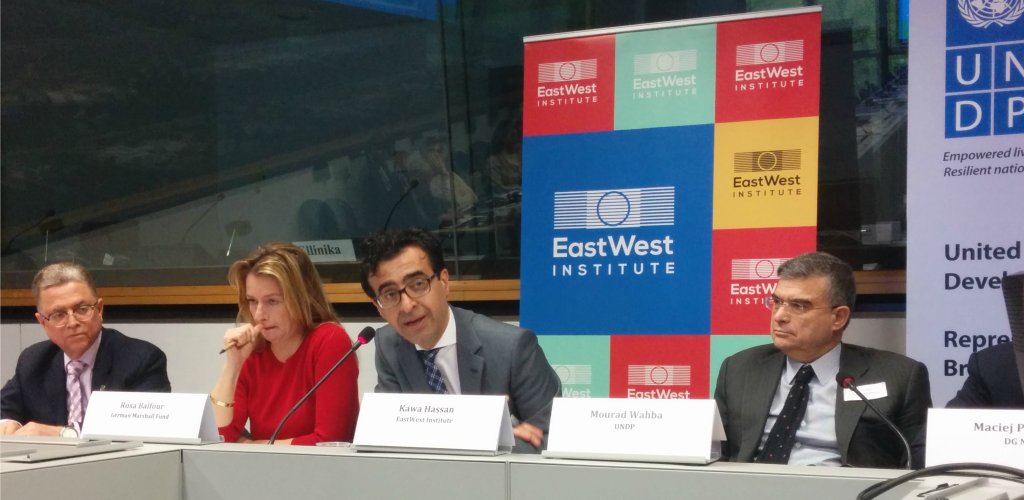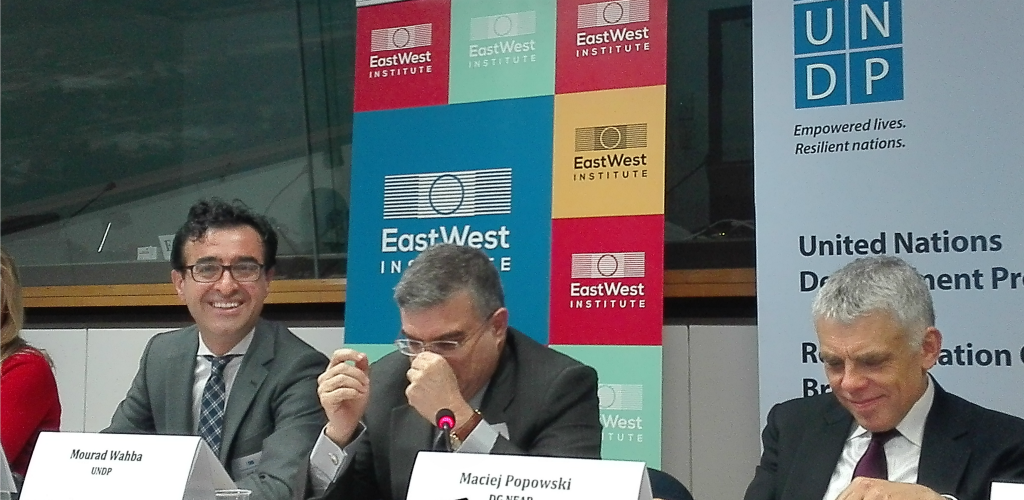The 2016 Arab Human Development Report highlights the important role of youth in achieving the development goals in the region.

Brussels, 6 April 2017 –The United Nations Development Programme (UNDP), the European Commission (EC) and the EastWest Institute (EWI) discussed today the development challenges and priorities in the Arab region, in particular the importance of youth empowerment as a new area of development cooperation in the region. Representatives of EU institutions, Arab Ambassadors to EU and members of the Brussels-based policy, development, and think tank community participated in the debate.
Anchored in the Arab Human Development Report (AHDR) 2016: Youth and the Prospects of Human Development in a Changing Reality, which UNDP published in November 2016, the debate examined links between the current priorities of the European Union, its individual institutions, and its member states, and the opportunities and challenges posed by the situation of youth in the Arab region.
Sixth in the series of AHDRs that UNDP has published since 2002, AHDR 2016 provides an evidenced-based overview on youth in the region. It underscores the demographic reality that the current youth cohort is largest the Arab region has ever witnessed. With two thirds of its 370 million inhabitants under the age of 30 and young people aged 15-29 years making up 30% of the Arab region’s total population of, this youth cohort is expected to dominate the development scene in the region for at least the next two decades.
“Our report argues that Arab countries can achieve a great leap forward in development, reinforce stability and secure such gains in a sustainable manner, if they adopt policies that give youth a significant stake in shaping their societies and put them at the center—politically, socially and economically,” stressed Mourad Wahba, Director of UNDP’s Regional Bureau for Arab States. “Arab countries will need significant assistance to pursue such an ambitious development agenda. We are looking to our European partners to support this pursuit, which we believe aligns very well with current EU policy priorities and interests with regards to the Arab regions.”
The debate examined findings of the AHDR 2016 on the effects of conflicts raging across many of countries in the region, as well as barriers hindering youth’s enjoyment of essential basic services in education and health, and access to decent employment, on the overall prospects for the future of youth in the Arab region.
“This forum has offered interesting insights into how conflict and exclusion are the key drivers of youth mobility in the region, compelling young people to seek a safer and better life elsewhere,” said Marjeta Jager, Deputy Director General for International Cooperation and Development in the EC. “The new European Consensus on Development considers youth as a key driver for achieving SDGs. We also encourage our partners to further invest in education, and use it as a tool for promoting peace, tolerance and cultural diversity. With a total portfolio of EUR 5.4 billion, the EU is a key donor in supporting the achievement of SDG4.”
The debate also considered means to operationalize the report’s call on Arab states to invest in a new youth-oriented development model that simultaneously builds young people’s capabilities and expands opportunities available to them, while prioritizing the achievement of peace and security at national and regional levels.
“The development model that the report suggests for youth empowerment makes sense, but it requires structural changes that may prove difficult for many Arab countries to implement,” explained Kawa Hassan, Director of the Middle East and North Africa Program in EWI. “European experiences in making public policies more youth-friendly and in formulating specific youth-oriented policies, may prove useful to Arab countries that are interested to heed the call of the AHDR 2016. Many European institutions will be happy to facilitate such critical experience exchange.”


For more information, please contact:
UNDP
Ludmila Tiganu, Communications Specialist, UN/UNDP Brussels. E-mail: ludmila.tiganu@undp.org Tel: +32 2 213 82 96
European Commission
Jörel Strömgren, Team leader, Communication and Transparency unit, Directorate-General for International Cooperation and Development. E-mail: joerel.stroemgren@ec.europa.eu Tel: +32-2-295 69 39
EastWest Institute
Lana Schmidt-Goertz, Program Assistant. E-mail: lsg@eastwest.ngo Tel: +32 2 743 46 22
About the Arab Human Development Reports (AHDRs)
The AHDRs engage institutions and citizens in Arab countries in analysis and discussion about factors which shape the choices and freedoms available to people across the region, so as to foster understanding and consensus around regional and national development priorities. They identify disadvantaged groups within the region, and suggest policies, strategies and opportunities for their empowerment. The Reports spur public debates and mobilize support for action and change through processes of consultation, research and report writing. They target policy-makers, opinion leaders and civil societies. AHDRs have helped to articulate perceptions and priorities in the region, and have served as a source of alternate policy opinion for development planning across varied themes.
About UNDP
UNDP partners with people at all levels of society to help build nations that can withstand crisis, and drive and sustain the kind of growth that improves the quality of life for everyone. On the ground in some 177 countries and territories, we offer a global perspective and local insight to help empower lives and build resilient nations.
About the European Commission
The European Commission is the executive institution of the European Union, responsible for proposing legislation, implementing decisions, upholding the EU treaties and managing the day-to-day business of the EU. The Commission's Directorate-General for International Cooperation and Development (DG DEVCO) is responsible for designing European international cooperation and development policy and delivering aid throughout the world.
About the EastWest Institute
The EastWest Institute (EWI) is an independent NGO that works to reduce international conflict, addressing seemingly intractable problems that threaten world security and stability. EWI is recognized and trusted for its unique capacity to bring together key policymakers, experts, business leaders and ground-breaking innovators—forging new connections, driving dialogue and introducing sustainable solutions.

